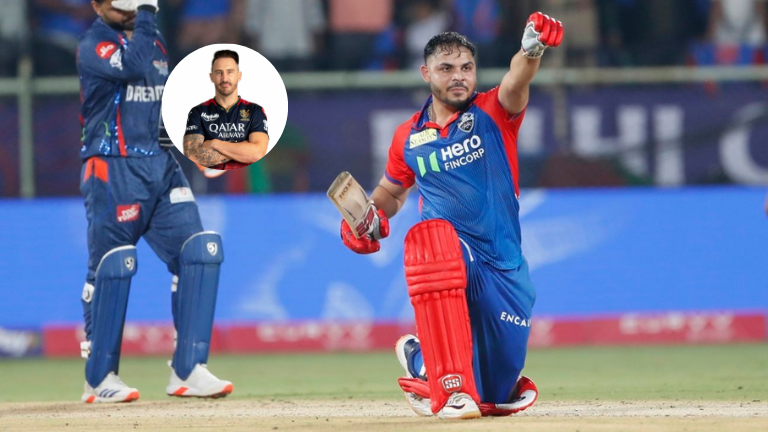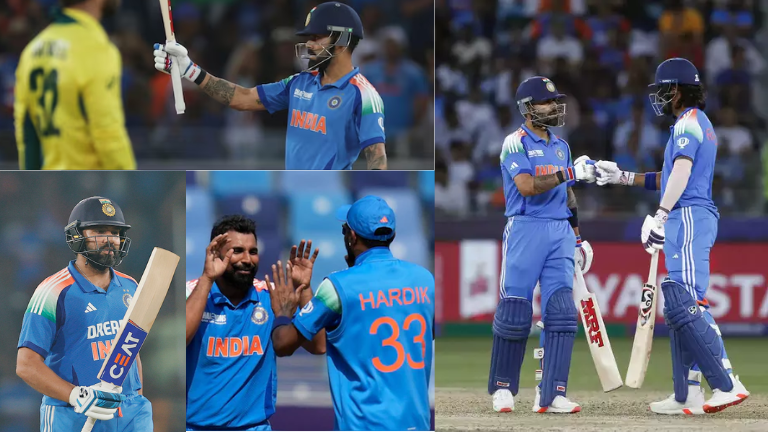Faf du Plessis on Impact Player Rule After DC’s Historic Win: “This Is Why It Exists”
Delhi Capitals pulled off one of the most thrilling comebacks in IPL history with a one-wicket win over Lucknow Super Giants in Visakhapatnam. Reduced to 7 for 3 and then reeling at 65 for 5 while chasing a daunting 210, DC looked all but out of the game. But Ashutosh Sharma’s heroics and a composed final over from Mohit Sharma turned the match into an instant classic. In the aftermath, Faf du Plessis on Impact Player rule made headlines as he reflected on the controversial regulation’s significance in such nail-biters.
DC’s finish was dramatic. With 22 needed off two overs and six required from the last six balls, the odds were heavily stacked against them. A close lbw appeal against Mohit Sharma on the first ball of the final over raised tensions. But Mohit survived, took a precious single, and got Ashutosh back on strike. The young batter responded with a towering six to secure a legendary one-wicket win — only the fifth such instance in IPL history.
Faf du Plessis on Impact Player Rule: “This Is What It’s Made For”
Speaking after the game, DC vice-captain Faf du Plessis on Impact Player rule drew comparisons to South Africa’s iconic 438-run chase against Australia in 2006, highlighting the role of tail-enders in sealing historic wins.
“Unbelievable, it actually reminded me a little bit of the 438 game against Australia when Makhaya [Ntini] got that important single towards the end,” said du Plessis. “That’s probably the best and most important single that Mohit Sharma has ever taken in his life. What a story to get the big man back on strike to hit it for six.”
More importantly, Faf du Plessis on Impact Player rule emphasized how this regulation, often criticized by traditionalists, came into its own during such moments.
“A lot of the cricketers, if you ask them, they would complain about the [Impact Player] rule in the IPL,” he noted. “But this is obviously why that rule is there — for games when you think that you’re completely dead and buried, someone comes in and plays like that.”
Ashutosh Sharma: The Impact Player Who Changed the Game
Ashutosh Sharma, Delhi’s designated Impact Player, walked in with the score reading 65 for 5 in the seventh over. By the 13th over, DC were 116 for 6, needing 94 off just 42 balls with four wickets remaining. At that point, ESPNcricinfo’s win predictor gave them a 1.56% chance of winning.
But Faf du Plessis on Impact Player rule rang truer with every passing over. Ashutosh and Vipraj Nigam stitched together a 55-run stand in just 22 balls, bringing the equation down to a manageable 42 from 24 balls. Nigam fell for a quickfire 39 off 15, but Ashutosh remained unbeaten on 66 off just 31 deliveries, sealing the match with a six.
Du Plessis Admits Impact Player Rule Changes Strategy
Reflecting further on the game, Faf du Plessis on Impact Player rule acknowledged how the presence of an extra batter changes the dynamics of a chase, especially on tricky wickets.
“To be honest, when I looked at the wicket and saw how much the ball was gripping and losing five wickets, I thought it was going to be an almost impossible task,” he admitted. “But it’s even great for the old brain of mine just to make sure that you can never be out of a game completely. The extra batter really makes a big difference.”
His remarks show the growing acceptance of the rule, which has been polarizing ever since its introduction. But in games like this, even the staunchest critics may be compelled to reconsider.
Indian Talent Shining Under Pressure
In another noteworthy observation, Faf du Plessis on Impact Player rule pointed out how domestic Indian players, often overshadowed by international stars, are showcasing world-class talent under pressure.
“As an overseas player, one thing that’s remarkable for me to watch is the amount of Indian players that are so powerful and have the ability to just strike the ball so easily,” du Plessis added. “It wasn’t an easy pitch. There was a lot going on, but the two boys at the back end there, just the way they came in and just effortlessly hit boundaries… it was special.”
Impact Rule Creating Impact
As the debate continues around the merits and drawbacks of the Impact Player rule, games like this provide fuel to its supporters. Faf du Plessis on Impact Player rule may be one voice among many, but his perspective, shaped by decades of top-level cricket, adds weight to the conversation.
Whether or not the rule stays long-term, its influence is undeniable. If Ashutosh’s innings and Mohit’s nerveless single prove anything, it’s that in T20 cricket, one player — even off the bench — can make all the difference.







